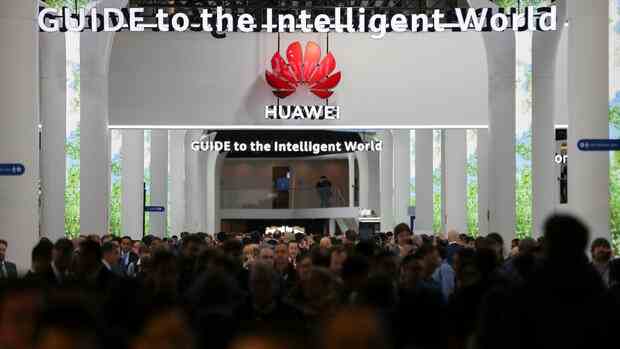Berlin The Federal Ministry of Economics warns of the consequences of a possible exclusion of certain Chinese components from the German 5G mobile network. “If extensive conversions are necessary due to prohibitions or orders, there can be a significant impact on the operation of mobile networks and the fulfillment of coverage requirements,” writes the ministry in a report to the Economic Committee in the Bundestag. The document is available to the Handelsblatt.
The coverage requirements were imposed on the network operators when the 5G frequencies were awarded in 2019. Since then, Telekom, Vodafone and Telefónica have had to close dead spots and also provide high-speed Internet along federal motorways, the most important federal roads and rail routes. This expansion could be delayed if a conversion is ordered. 5G describes the latest mobile communications standard.
The reason for the report from the Ministry of Economics is a recent inspection by the Federal Ministry of the Interior (BMI) of all critical – i.e. security-relevant – parts of the Chinese suppliers Huawei and ZTE that are already installed in the network.
The Ministry informed the network operators in writing. In the letter, the ministry considers the components of the two Chinese manufacturers to be a possible nuisance to public order and security in Germany. The fear is that China could gain access to important infrastructure.
Until now, the obligation to inspect only referred to critical parts that were newly installed. The Economics Committee therefore requested a statement from the Ministry of Economics “on the allegedly planned ban on Huawei and ZTE components in the German mobile network”.
The fact that the ministry is critical of the process is remarkable in that department head Robert Habeck (Greens) advocates in principle the exclusion of certain Chinese components from the 5G network. Europe should rely more on its own technology in the area of critical infrastructure, the Vice Chancellor recently explained at the opening of the international trade fair in Munich. Habeck’s ministry was only vague about the possible consequences of the BMI test for the expansion of mobile communications.
Effects on other areas of the German economy are also conceivable
According to the report, this cannot be reliably estimated at this point in time. The effects depended on the specific order of the Ministry of the Interior as well as ancillary provisions, such as transitional periods for the replacement of components.
The Ministry of Economic Affairs expressed the expectation that the possible effects of a ban would be examined on a case-by-case basis.
>> Read also: Government plans to ban Huawei and ZTE technology in the German network
The report to the committee also suggests that Habeck’s ministry is apparently concerned about further negative economic consequences should the interior ministry make a decision against Huawei and ZTE at the end of the review process. There is talk of components from Chinese manufacturers being used “in numerous sectors”. “The effects on other areas of the German economy cannot currently be reliably estimated.”
A spokesman for the Ministry of the Interior recently stated that the test is not aimed at specific providers. The aim is to reduce dependency on individual providers. Earlier, a person familiar with the matter told Handelsblatt that the government could tighten its security checks in a way that could lead to the exclusion of certain Chinese components from the 5G network.
This is now to be checked on the basis of the laws in the core and access networks that will be amended in 2021. It also addresses the question of whether telecommunications companies can install security-related components from companies that are under the direct or indirect control of a foreign government.
Because of their proximity to the government in Beijing, Chinese companies like Huawei have long been under close scrutiny in numerous countries. The concern is that China could gain direct or indirect access to cellphone user data.
The Ministry of the Interior answered questions from the Digital Committee on Wednesday. The ministry therefore explained that the components from Chinese suppliers would be checked to see how safety-relevant they were. This includes, for example, the question of whether the software for controlling a cell phone system from China can be switched off or tapped.
The ministry did not want to explain why it decided to take this test, said digital politician Reinhard Brandl (CSU). The impression was created that the decision had not been coordinated with the other ministries involved and the Chancellery. “I don’t think there will be a ban,” said Brandl.
However, the USA had already classified Huawei and ZTE as a threat to national security in 2020 and tightened the restrictions on US deliveries to Huawei a few weeks ago.
Other countries in Europe are stricter than Germany
In 2021, the federal government had imposed high hurdles for the approval of companies as suppliers for the development of modern 5G mobile networks. However, she refrained from an explicit ban on components from Huawei or ZTE. According to information from government circles, the background to this are legal problems with the exclusion of individual companies and the fear of Chinese countermeasures.
>> Read also: Europe’s technology dispute with China is widening
Other countries in Europe are stricter: Sweden, for example, has ordered its mobile phone companies to remove Chinese components from their networks by January 1, 2025. In the UK, Huawei components are expected to disappear from core networks by the end of this year.
In France, mobile operators should not be able to renew licenses for equipment containing Huawei components, which amounts to a ban.
Government circles in Berlin said that it was not yet possible to say exactly which components of the 5G network were affected. A spokesman for the Ministry of the Interior emphasized, however, that no compensation is expected for the mobile phone companies affected if the system is expanded. The current law does not provide for this.
More: Telecom industry complains about possible Huawei ban.

